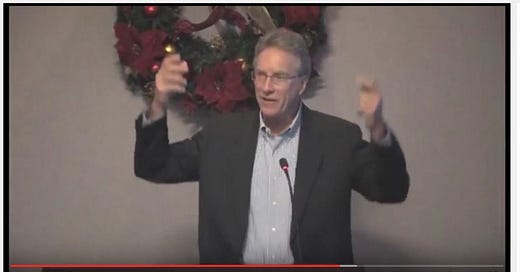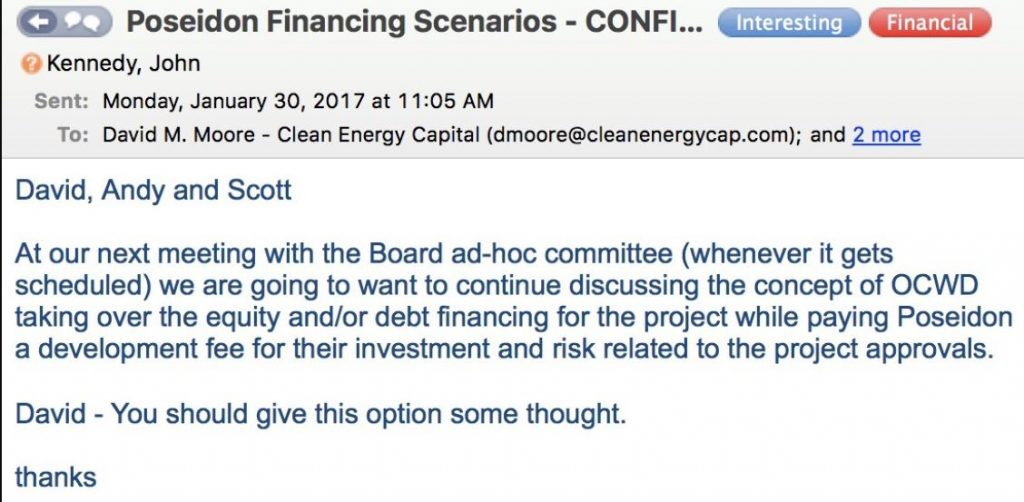OCWD: Poseidon's Role in Hidden Committee Meetings Explained
Note: The Surf City Voice website was destroyed by hackers in December, 2019 and is under reconstruction. This story was first posted June 6, 2018 under the headline "Orange County Water District: Desal Developer's Exclusive Involvement in Hidden Committee Meetings Explained."
John Kennedy is the Executive Director of Engineering and Water Resources for the Orange County Water District (OCWD).
He also manages the District’s Desalination Funding Ad hoc Committee, “so-called” because it acts just like a standing committee, which California’s Ralph M. Brown Act says must hold public meetings, where an ad hoc committee is exempt.
John Kennedy, OCWD Executive Director of Engineering.
In a related story (see “Spurious”), I explain the legal issues surrounding committees formed by local legislative bodies, including water districts, and why the Desalination Funding Ad hoc Committee violates the Brown Act and must open its meetings to the public.
In a lengthy interview with Kennedy last February, I noted the exclusive and frequent involvement with the committee—including regular attendance at its meetings (over 23 have been held since September, 2015)—allowed to CEOs of Poseidon Resources, Inc., the company trying to contract with the OCWD to build and run a $1 billion ocean desalination plant in Huntington Beach.
Kennedy said that there is a reason for Poseidon’s involvement in the meetings—which are closed to the rest of the public—and there’s nothing illegal about it.
“You’re just overthinking it or you have something pictured in your mind and that’s not what it is,” he said.
“We’re trying to figure out how to lower the cost,” he explained. “And we’ll say, ‘What if the water district issues a hundred million of debt because we can issue the debt cheaper. And what if we integrate that into Poseidon’s financing?’ And then they’ll tell us, ‘Well, here’s what it would take and here’s what would have to happen. And so, we need them to explore these ideas.”
During the “ad hoc” meetings, Kennedy noted, the committee told Poseidon that it wanted a term sheet that agreed to a 30-year [take or pay] contract, not a 50-year contract.
Poseidon counter-offered with a 35-year contract, saying it could lower the project cost that way, and the committee agreed, as Kennedy notes in his report to the OCWD Board of Directors for its upcoming (June 6) public meeting when it will consider the revised term sheet:
“The District’s Desalination Ad-hoc [sic]Committee worked with Poseidon to develop the proposed cost figures provided in this report. The 2018 Term Sheet and this report include refined unit cost estimates the District could pay to Poseidon Resources beginning in [the] year 2022. The 2018 Term Sheet is for 30 – 35 years.”
The “two big things” the committee discussed, Kennedy said, were trying to lower the unit cost Poseidon’s equity return. To help with that issue, the committee brought in financial consultant David Moore from Clean Energy Capital.
“And David Moore has a model. So, that’s the first big thing that’s been going on in the meetings, is just how to lower the cost,” Kennedy said.
“Confidential” email about a topic for the Desalination Funding Ad hoc Committee.
Another big issue discussed by the committee, Kennedy said, was a myriad of options for distributing the 50 million gallons of desalinated water per day that Poseidon would produce.
From a presentation given at a Dec. 9, 2015 meeting of the “Desal Funding Ad hoc Committee.”
The results of those committee discussions are in the revised proposed Poseidon term sheet.
Responsibility for constructing the distribution system would shift from OCWD to Poseidon, but a final distribution plan remains elusive.
“There’s [sic] tons of institutional and engineering issues with this option,” he said, “so we’ve been looking into all of that. And nothing’s easy.”
Kennedy was to the point when asked why the District and its ratepayers wouldn’t benefit if the board and its committee also involved stakeholders who favored alternatives to the Poseidon project—which the board has steadfastly refused to do despite claims to the contrary—in its search for reliable water sources.
“They [Poseidon] are our partner[s],” he answered. “If the project goes through; you know, we’re partnering together to do the project.”
Poseidon VP Scott Maloni, committee members, and OCWD staff work together so closely that Maloni is even allowed to edit staff documents and letters to regulatory agencies, something that seems natural to Kennedy.
“I’ve written letters on stuff that I maybe knew 90 percent of and I would forward to Scott to make sure I didn’t say anything wrong or I didn’t miss anything,” he explained.
“It’s kind of a weird position,” he added, “but they’re our project partner, but we still haven’t negotiated a final agreement with them.”
Kennedy describes the Poseidon project as the possible opportunity of a lifetime to explain the OCWD BOD’s obsession with it.
“It’s very unique for a private company to come in and do what they’ve done,” Kennedy believes, adding that increasingly restrictive environmental protection laws make it imperative to act now.
“Some people say, ‘Let’s wait, it’s too early for its time and we don’t need it yet, let’s wait 10 or 15 years.’ [But] who knows that the laws will be in 10 or 15 years. So you can make an argument that if you don’t do it now you may never get the chance again.”
Casting aside claims of less costly alternatives for creating water supply reliability, Kennedy believes that the chance to have 50,000 acre-feet of desalinated ocean water in our backyard deserves good consideration.
“I think that’s exactly why we have board members, you know, wanting to really consider this.”
Desalination Funding Ad hoc Committee Documents






